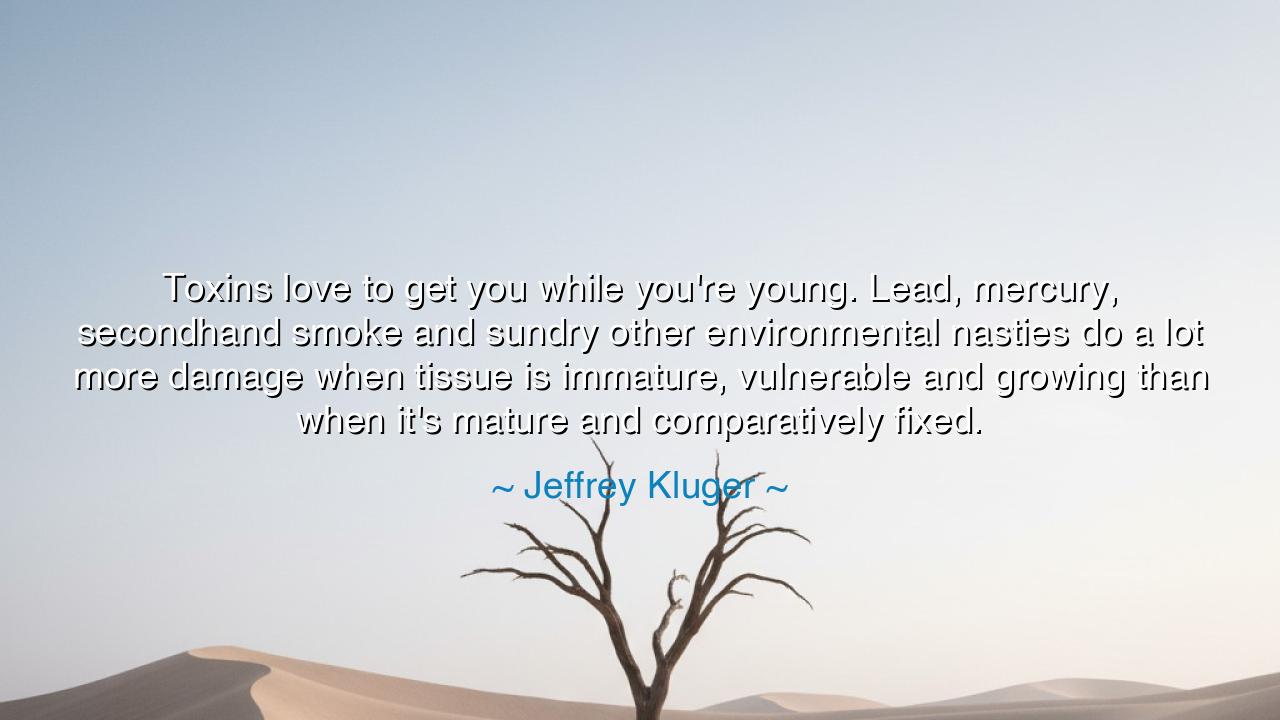
Toxins love to get you while you're young. Lead, mercury
Toxins love to get you while you're young. Lead, mercury, secondhand smoke and sundry other environmental nasties do a lot more damage when tissue is immature, vulnerable and growing than when it's mature and comparatively fixed.






When Jeffrey Kluger wrote, “Toxins love to get you while you're young. Lead, mercury, secondhand smoke and sundry other environmental nasties do a lot more damage when tissue is immature, vulnerable and growing than when it's mature and comparatively fixed,” he spoke not only as a journalist of science but as a guardian of life’s beginnings. His words carry both the sharpness of warning and the tenderness of protection. He reminds us that in the earliest stages of existence — when flesh, mind, and spirit are forming — the smallest harm can echo for a lifetime. The body of a child is sacred soil, fertile and fragile; what is planted there, whether poison or purity, will determine the harvest of their years.
The origin of this truth lies in Kluger’s deep study of biology and human development. As a senior science editor for TIME Magazine, he spent years chronicling the hidden battles between human health and the toxic world we have built around ourselves. His observation emerges from the findings of modern neuroscience and environmental medicine, which reveal that the young — the unborn, the infant, the child — are far more sensitive to the invisible assaults of lead, mercury, and chemical pollution than adults. Their organs, still in bloom, cannot defend against these intrusions; their cells, still dividing, carry forward the damage. What Kluger exposes, therefore, is not only a medical fact but a moral one: that the careless waste of an age falls most cruelly upon those too young to bear it.
To the ancients, this idea would have been woven into the laws of nature and virtue. The Greeks spoke of paideia — the sacred duty to nurture the next generation in mind and body. The Hebrew scriptures proclaimed, “Train up a child in the way he should go,” knowing that what enters the young soul shapes its destiny. And the healers of China warned that imbalance in early life leads to weakness in all the years that follow. In each tradition, the wisdom is the same: that youth is the foundation of the world, and the measure of a civilization is how it guards its children from harm. Kluger’s voice, though modern, rises from this ancient well of understanding — that what is most precious is most easily broken.
History offers a painful example of this truth in the tragedy of lead poisoning. For centuries, humans praised lead’s usefulness — its softness, its shine, its presence in pipes, paints, and fuels. But when the signs of sickness began to appear — in the minds of children, in their faltering speech and dimmed intellects — it became clear that we had poisoned our own offspring in pursuit of convenience. Entire generations suffered diminished potential because the world failed to protect them while they were young, vulnerable, and growing. It was not merely a scientific failure, but a spiritual one — the sin of neglecting innocence.
Kluger’s phrase, “toxins love to get you while you’re young,” carries within it both poetry and terror. It personifies poison as a hunter, drawn not to the strong but to the defenseless. This is true not only of chemical toxins but of all poisons — the toxins of greed, of ignorance, of indifference. They, too, creep into young lives through the air they breathe, the water they drink, the examples they see. The physical harm of pollution mirrors the moral harm of neglect: when children grow amid corruption, violence, or despair, their spirits absorb wounds just as their bodies absorb toxins. Both kinds of damage — bodily and spiritual — are slow, invisible, yet lasting.
And yet, in his warning, there is also hope. For if the young are so impressionable to harm, they are equally impressionable to care. A clean environment, nourishing food, loving homes, and minds filled with curiosity and kindness — these are antidotes no less powerful than any medicine. When society chooses to protect its children, it protects its future; when it purifies the world for their sake, it redeems itself. To heal the Earth, then, is not an abstract mission — it is an act of love toward the generations still unborn.
The lesson of Kluger’s wisdom is clear: guard the beginnings. Be mindful of what touches the young — in body, in spirit, in thought. Support clean air, safe water, and strong communities. Refuse to tolerate the poisons that profit a few while endangering the innocent. Teach by example, for every act of care plants resilience in the soil of tomorrow.
So, my children, remember this eternal truth: life is most sacred when it is most fragile. The young are not yet fixed, not yet hardened by the world; they are the promise of what humanity may yet become. Protect them — from toxins of metal, of mind, of morality — and you protect not only their lives but the very essence of hope itself. For the strength of a people is not in its weapons, nor its wealth, but in the purity of the breath that fills its children’s lungs and the light that fills their hearts.






AAdministratorAdministrator
Welcome, honored guests. Please leave a comment, we will respond soon